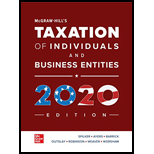
Concept explainers
Explain the reason of Z, the friend of J for the negative view on tax course.
Explanation of Solution
What is Tax: A tax is a payment levied by the order of Federal, state or local government agencies and collected from the general public to fund the developmental work of the government and not directly linked to the benefits received by the public. A tax must have following characteristics;
- 1. Tax is mandatory payment from the eligible public/enterprise
- 2. Tax is levied by the Government agencies
- 3. Tax has no direct relationship with the benefit received by the taxpayer
Taxes are integral part of everybody’s life. Tax plays a major role on multiple personal/organizational decision of ones’ life, like deciding on the investment avenues, choosing among the different jobs, savings for specific needs of life, making or receiving gifts or estates, tax planning and many more.
Since, Tax is an important aspect of ones’ life and all must take tax course for their own interest. Hence, Z’s negative view on tax is out of place and naïve.
Want to see more full solutions like this?
Chapter 1 Solutions
MCGRAW-HILL'S TAX.OF INDIV.+BUS.2020
- I am trying to find the accurate solution to this general accounting problem with appropriate explanations.arrow_forwardWhat is the primary goal of financial management?A) Maximizing profitsB) Maximizing shareholder wealthC) Minimizing costsD) Ensuring liquidityarrow_forwardWhich of the following is NOT an example of an operating activity in cash flow statement? a) Receipts from customersb) Payments to suppliersc) Proceeds from issuing sharesd) Payments to employeesarrow_forward
- Can you solve this general accounting problem using accurate calculation methods?arrow_forwardPlease provide the answer to this general accounting question using the right approach.arrow_forwardThe accounting equation is:a) Assets + Liabilities = Equityb) Assets = Liabilities + Equityc) Liabilities = Assets + Equityd) Assets + Equity = Liabilitiesarrow_forward
- General Accountingarrow_forwardThe primary objective of financial accounting is to:a) Provide management with detailed reports for decision-making.b) Help the company save taxes.c) Provide financial information to external users.d) Track inventory levels. need help!arrow_forwardI need help with this general accounting problem using proper accounting guidelines.arrow_forward
- Business/Professional Ethics Directors/Executives...AccountingISBN:9781337485913Author:BROOKSPublisher:Cengage





